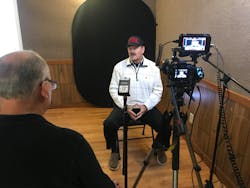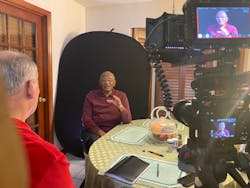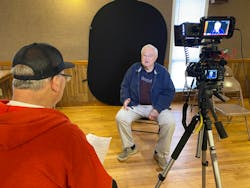Preserving the Perishable
It’s a feeling experienced by many in the fire service—a fierce sense of camaraderie. Most firefighters describe it as being part of something bigger than themselves. Some say it’s like having another family. There’s assurance knowing that the man or woman fighting fires alongside you has your back and you have theirs. As firefighters retire and leave the firehouse, however, part of that identity becomes lost. “There is definitely a void when a firefighter goes back to the firehouse after retirement and no one knows your name,” says retired Battalion Chief Larry Cockman of the Greensboro, NC, Fire Department. Through the process of working on a written history book of the department, the Greensboro History Book Committee realized the importance of preserving the stories of its retirees. “What’s happening is that retirees are dying and their stories from the fire service are going with them," says Cockman. Now a group of retired and active duty firefighters with the Greensboro Fire Department is seeking to change that.
Cockman, along with retired Captain Harold Haynie and active duty firefighter Lamar Sullivan, are working on an expansive project collecting video interviews with retirees—capturing not only the history of the department, but also giving retirees a chance to tell their stories.
One of Cockman’s favorite parts about conducting and watching the interviews is seeing the emotional impact it has on the retiree. “I can see their happiness as they recount their days in the fire service,” he says. “We ask them about 26 questions … their memories both good and bad about experiences on and off the job. They tell us about the hardest calls they’ve been on and some of the pranks they’ve pulled on one another.”
The trio has captured dozens of hours of audio-visual history through 18 interviews so far, with another 45 interviews scheduled. Anyone in the department who is getting ready to retire or who has been retired—no matter how long—is welcome to share their story. A copy of the interview is given to the firefighter, another is archived at the department and a final copy will eventually be archived at the National Fire Heritage Center (NFHC), a non-profit organization working to preserve the history of fire in America.
The Greensboro Fire Department, however, is just one of many in the U.S. placing an importance on collecting the stories of then and now.
The growing interest in video storytelling
What they are doing in North Carolina is being mirrored in towns and cities across the country, says Sam Goldwater, executive director of NFHC. The NFHC’s mission is to preserve all things fire protection history, from drawings and books to college academic programs and yes, even audio-visual stories. “It just happens that the history of fire protection in the United States is also a history of the United States,” says Goldwater. “We need to capture today’s stories because that’s tomorrow’s history."
The interest from fire departments at the local level in collecting video stories is relatively new due to the technology available today, says Goldwater. "It’s a growing interest as our fire population gets older and they live longer. They are more interested in preserving the history,” he says. “And now that it can be done with technology most people already have, it makes it easier for someone with little technical skill to take on.”
As part of its effort to preserve fire protection history, the NFHC helps local fire departments, including the Greensboro Fire Department, with ways in which to get started capturing stories via video. “We get a lot of folks who understand that they are losing information as people pass away, so they come to us and ask us what to do,” says Goldwater. The NFHC can help local departments with a lot of the challenges from an operation perspective, including offering suggestions of what kinds of questions to ask interviewees, the type of background to have in the video, and the technology to use. Though all of the videos are done at a local level, the NFHC will collect the videos to make them part of the national archive once the department has a solid interviewing process in place. Goldwater stresses that although it can seem like a large and time-consuming project at the beginning, it does eventually become about maintenance—keeping up with the interviews as firefighters retire.
Goldwater points out that stories at a local level play an integral role in capturing the national history of the fire protection service. He says, “You can start seeing the collective impact of what the group in Greensboro is doing—while important for their community—it becomes even more important when you look at it from a collective national point of view.”
Capturing history
Back in Greensboro, as word spreads of the video interviews, Cockman anticipates more retirees will share their stories. “What’s happening is that the retirees are talking amongst themselves and it’s all positive, so those that were apprehensive at first of speaking with us are now more seriously thinking about sharing their story,” he says. “We’re anticipating another 80 to 100 interviews, but even if all 280 retirees want to share their story, we will do it. We will get it done.”
When it comes to interviewing men and women from different generations with different experiences, Cockman says it has been eye-opening. There have been many changes in the fire service through the decades, including the improvements of equipment and technology. But what’s apparent through all retiree interviews is that the courage and bravery that it takes to mitigate a disaster hasn’t changed. The brotherhood and camaraderie of the fire department hasn’t changed, either, says Cockman. “Knowing that when you go into a fire, that that guy or gal beside you has got your back and there’s no issue if they are black or white, male or female. When the chips are down, you’re all on one mission.” That is what being part of the firefighting family is all about and what he hopes is captured on video for future generations to see.
If you’re interested in learning more or would like more information on how to collect videos in your own department, you can reach out to Larry Cockman at [email protected] or Sam Goldwater at [email protected].


